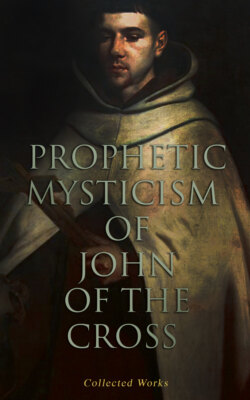Читать книгу Prophetic Mysticism of John of the Cross (Collected Works) - John ofthe Cross - Страница 50
ОглавлениеPROLOGUE
Inasmuch as this canticle seems to have been written with some fervor of love of God, whose wisdom and love are, as is said in the book of Wisdom, so vast that they reach "from end to end," and as the soul, taught and moved by Him, manifests the same abundance and strength in the words it uses, I do not purpose here to set forth all that greatness and fullness the spirit of love, which is fruitful, embodies in it. Yes, rather it would be foolishness to think that the language of love and the mystical intelligence — and that is what these stanzas are — can be at all explained in words of any kind, for the Spirit of our Lord who helps our weakness — as St. Paul says — dwelling in us makes petitions for us with groaning unutterable for that which we cannot well understand or grasp so as to be able to make it known. "The Spirit helps our infirmity . . . the Spirit Himself requests for us with groanings unspeakable." For who can describe that which He shows to loving souls in whom He dwells? Who can set forth in words that which He makes them feel? and, lastly, who can explain that for which they long?
2. Assuredly no one can do it; not even they themselves who experience it. That is the reason why they use figures of special comparisons and similitudes; they hide somewhat of that which they feel and in the abundance of the Spirit utter secret mysteries rather than express themselves in clear words.
3. And if these similitudes are not received in the simplicity of a loving mind, and in the sense in which they are uttered, they will seem to be effusions of folly rather than the language of reason; as anyone may see in the divine Canticle of Solomon, and in others of the sacred books, wherein the Holy Spirit, because ordinary and common speech could not convey His meaning, uttered His mysteries in strange terms and similitudes. It follows from this, that after all that the holy doctors have said, and may say, no words of theirs can explain it; nor can words do it; and so, in general, all that is said falls far short of the meaning.
4. The stanzas that follow having been written under influence of that love which proceeds from the overflowing mystical intelligence, cannot be fully explained. Indeed I do not purpose any such thing, for my sole object is to throw some general light over them, which in my opinion is the better course. It is better to leave the outpourings of love in their own fullness, that everyone may apply them according to the measure of his spirit and power, than to pare them down to one particular sense which is not suited to the taste of everyone. And though I do put forth a particular explanation, still others are not to be bound by it. The mystical wisdom — that is, the love, of which these stanzas speak — does not require to be distinctly understood in order to produce the effect of love and tenderness in the soul, for it is in this respect like faith, by which we love God without a clear comprehension of Him.
5. I shall therefore be very concise, though now and then unable to avoid some prolixity where the subject requires it, and when the opportunity is offered of discussing and explaining certain points and effects of prayer: many of which being referred to in these stanzas, I must discuss some of them. I shall, however, pass over the more ordinary ones, and treat briefly of the more extraordinary to which they are subject who, by the mercy of God, have advanced beyond the state of beginners. This I do for two reasons: the first is, that much is already written concerning beginners; and the second is, that I am addressing those who have received from our Lord the grace of being led on from the elementary state and are led inwards to the bosom of His divine love.
6. I therefore trust, though I may discuss some points of scholastic theology relating to the interior commerce of the soul with God, that I am not using such language altogether in vain, and that it will be found profitable for pure spirituality. For though some may be altogether ignorant of scholastic theology by which the divine verities are explained, yet they are not ignorant of mystical theology, the science of love, by which those verities are not only learned, but at the same time are relished also.
7. And in order that what I am going to say may be the better received, I submit myself to higher judgments, and unreservedly to that of our holy mother the Church, intending to say nothing in reliance on my own personal experience, or on what I have observed in other spiritual persons, nor on what I have heard them say — though I intend to profit by all this — unless I can confirm it with the sanction of the divine writings, at least on those points which are most difficult of comprehension.
8. The method I propose to follow in the matter is this: first of all, to cite the words of the text and then to give that explanation of them which belongs to the subject before me. I shall now transcribe all the stanzas and place them at the beginning of this treatise. In the next place, I shall take each of them separately, and explain them line by line, each line in its proper place before the explanation.
